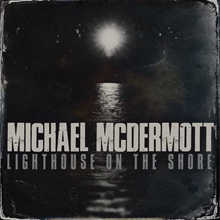By Monk
 Music has two personalities, a duality frequently characterized by quiet introspection and power-driven proclamation. If you were a photographer, it would be light and dark. If you were a painter, it would be black and white. For a musician, it’s acoustic and electric. Veteran songwriter Michael McDermott has chosen to explore this duopoly via the simultaneous release of a diptych of two albums reflecting what he himself describes as a balancing act between his multiple musical personalities. It’s certainly not (as the PR blurb espouses) an innovative approach – Ricky Warwick, for one, did it to stunning effect back in 2016 with his magnificent ‘When Patsy Cline Was Crazy (And Guy Mitchell Sang The Blues)’/’Hearts On Trees’ double set – but it is an opportunity for an artist to present two compatible but different sides to his talent in a way which is complementary and homogenous but at the same time lets each stand alone and be considered as two sides of the same time.
Music has two personalities, a duality frequently characterized by quiet introspection and power-driven proclamation. If you were a photographer, it would be light and dark. If you were a painter, it would be black and white. For a musician, it’s acoustic and electric. Veteran songwriter Michael McDermott has chosen to explore this duopoly via the simultaneous release of a diptych of two albums reflecting what he himself describes as a balancing act between his multiple musical personalities. It’s certainly not (as the PR blurb espouses) an innovative approach – Ricky Warwick, for one, did it to stunning effect back in 2016 with his magnificent ‘When Patsy Cline Was Crazy (And Guy Mitchell Sang The Blues)’/’Hearts On Trees’ double set – but it is an opportunity for an artist to present two compatible but different sides to his talent in a way which is complementary and homogenous but at the same time lets each stand alone and be considered as two sides of the same time.
Having first been introduced to McDermott a little more than two years ago, when he took us a nostalgic trip down ‘St Paul’s Boulevard‘, I sort of new to expect from the acoustic side of the package, which is presented to us first. Drawing from the lessons learned in the schools of Dylan, Petty, Cohn (and indeed Cohen) and Springsteen, his dark, raspy vocals once again recount, in eloquently poetic style the life experiences of a songsmith, musician and troubadour who has been around more than a few blocks more than a few times during his 30+ year career, leaving him with plenty of stories to tell – stories which he once again relates here with passion and inherently individual personality.
Ranging from beautifully realized after hours bar room laments such as the stripped back piano/vocal duopoly of opener ‘Bradbury Daydream’ and the Celtic-tinged ‘Goddammit Lovely’ to the Springsteen-inflected melancholia of ‘Hey-La Hey #23’, the ebulliently defiant ‘Gonna Rise Up’ and the subtle drama of ‘Where God Never Goes’, this is an album delivered straight from the heart… and one which which leads to one point…
The title track is one of those moment in time songs, that stops you in your tracks, it’s dark, laconic eloquence appellant and almost pleading, the mournful piano intro leading into McDermott’s breathless vocal, accentuated by Heather Lynne Horton’s beautiful violin laying everything bare in a heartrendingly picturesque, poetic confession to a love that provides the beacon for life’s direction. It is a beautifully simple, but not simplistic, evocation of that feeling you get when you wake in the wee small hours, glance over at the person you love lying beside you and realize what a light they shine into your life, even in those darkest hours.
The opening of the second album is initially somewhat enigmatic, opening as it does with an acoustic-led intro, but ‘FCO’ quickly develops into the sort of Celtic-infused pop dance anthemic that will be familiar to fans of Big Country or The Alarm, although McDermott does retain some of the lyrical pathos evident on the first album, perhaps to help with the natural procession from one half to the other.
Things pick up with the Petty-referencing lead single ‘Berlin At Night’, which encapsulates McDermott’s ability to deliver a well-crafted pop rock song, as does ‘A Head Full Of Rain’, with both songs having a very Nineties MTV/college radio-friendly vibe to them. The latter in particular reminds of The Traveling Wilburys, for some strange reason… ah well, perhaps it’s its promise of it being “sunny every day”: we wish!
Heather Lynne Horton’s albeit denser violin intro to the title track provides a natural connection to, and synergy with that of the first half. Rather than contrasting with its predecessor, it both compliments and progresses the overall thematic, with the album not really hitting its “heavier” groove until just before its midpoint, but even then it does with a sense of anticipated evolution. The rockiest song by far is ‘Behind The Eight’, which is an energetic slice of dance floor filling Midwest rock groove which brings to a peak the growth shown on the likes of ‘Quicksand’ and the suitable retro vibe of ‘Charlie Brown’, before the album comes full circle with the piano-led ‘Whose Life I’m Living’.
The overall result is two albums which naturally and organically compliment each other rather that differentiate from themselves. Equally laconic and demonstrative, they are an exemplar of quality songwriting, exemplified by the combination of beautifully evocative lyrics and thoughtfully paired musicianship.
- ‘Lighthouse On The Shore’/’East Jesus’ will be released on 13 September.
facebook.com/MichaelMcDermottMusic
- All content © Über Rock. Not to be reproduced in part or in whole without the express written permission of Über Rock.
